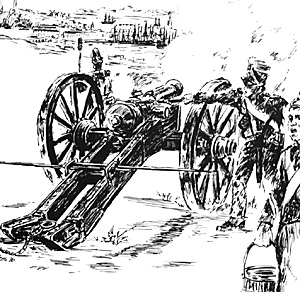 The Strategic Situation
The Strategic Situation
Sir John Moore, commander of the largest single British land force since Marlboro, had been retreating for several weeks. On paper, his force consisted of over 25,000 men. It was heavily an infantry force but extremely weak in cavalry. He had for the last several months in 1808 been campaigning in support of the Spanish resistance to the French take-over of Spain.
The army had advanced into northern Spain in the hopes of helping three large Spanish armies to hold the main French armies in the northern quarter of the Iberian peninsula. While Moore's army was advancing to position, Napoleon took command of the strongly reinforced French forces and rapidly destroyed or routed the Spanish armies.
Though Moore's first impulse was to pull back immediately and guarantee the safety of the only British army in existence, he received captured intelligence that showed Napoleon to be unaware of the location or size of his force. The French armies were continuing to sweep southward to secure their hold on Madrid and capture Lisbon.
Deciding that his force was too
small to halt this advance (his
correspondence shows that he
believed he was facing at most 90,000
Frenchmen while in reality there were
more than 150,000 men under
Napoleon on the peninsula), Moore
chose another strategy. He decided he
would "threaten the French
communications and create a diversion
. . ." [1]
The army moved into northern
Spain on the rear of the bulk of the
French.
Two days earlier, in a letter to
Castlereagh on his situation, he
commented that "if the bubble bursts,
we shall have a run for it." After gaining
minor victories in small engagements
with local French forces, the bubble
burst in midDecember. While Soult,
with a force as large as the British,
maintained an active contact with
Moore from the northeast, Napoleon
ordered Ney to move north from Madrid
with 35,000 men, including portions of
the Imperial Guard. The plan was to
crush the British army between these
two forces.
Fortunately for Moore, Napoleon
made the mistake of assuming that a
portion of the British artillery sent into
Spain by a circuitous route was the
main British force. He therefore ordered
a concentration too far from the actual
force to bring it into battle, allowing
Moore time to begin an orderly withdrawal.
With Moore in full retreat,
Napoleon returned to Madrid and,
characteristically, declared a victory.
Soult's force maintained a harassing
contact with the British for the length of
the retreat. However, the British army
suffered in this retreat far more from the
effects of human nature and the low
character of the typical British soldier.
Drunkenness and desertion
became severe problems in many
units as morale sagged. Many of the
relatively less well trained units lost
their cohesion during the march,
slowing the march and causing even
more straggling. Diaries and letters
rage against the general who was
retreating so precipitously and wouldn't
bring his army to battle.
Fortunately there were several
units which not only maintained
discipline, but began establishing
some of the most distinguished
records in the British annals. The
cavaIry, under Lord Paget, showed their
typical dash and daring and also
demonstrated self control that was
often lacking in later actions. Lord
Paget's brother commanded the
Reserve division, consisting mainly of
two light regiments that had been
previously trained by Sir John Moore.
These were the 52nd Light and 95th
Rifles. These units under both Pagets
served as a most effective rear guard;
using terrain to great advantage, they
were able to delay and disorganize
Soult's forces on several occasions
buying needed time for the slowly
retreating army.
Arrival in Corunna
Ragged, weakened, and
frustrated, the army arrived at Corunna
on January 11. Unfortunately, due to
adverse weather, the transports to
return the army to England did not reach
the port until January 15. During this
time Soult was able to collect and
prepare his pursuing forces for one
final attempt at decisively defeating the
British before they escaped.
The French began their attack
around noon on January 16, 1809.
More Corunna
Back to Grenadier Number 9 Table of Contents
Back to Grenadier List of Issues
Back to MagWeb Master Magazine List
© Copyright 2001 by Pacific Rim Publishing
This article appears in MagWeb (Magazine Web) on the Internet World Wide Web. Other military history articles and gaming articles are available at http://www.magweb.com